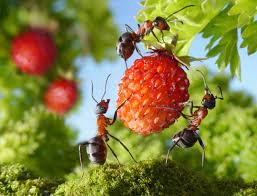Earlier this week I shared with our staff some big lessons we can learn from little critters. Proverbs 30:24-28 states,
Four things on earth are small,
but they are exceedingly wise:
the ants are a people not strong,
yet they provide their food in the summer;
the rock badgers are a people not mighty,
yet they make their homes in the cliffs;
the locusts have no king,
yet all of them march in rank;
the lizard you can take in your hands,
yet it is in kings' palaces.
First, how did these creatures become “extremely wise”? Were they taught by human instructors? No, they gained their wisdom from their Creator. How much more should men and women, boys and girls, who have been created in the image of God seek his wisdom? (See James 1:5)
Ants, rock badgers, locusts and lizards don’t learn from us, but we sure can learn a lot from them! Each of these critters model a virtue and a valuable lesson attached to it.
Ants model the virtue of industry and teach us that hard work can overcome individual weakness. They store up food all summer, knowing that winter is coming. As some might put it, they “make hay while the sun shines.” Are you a hard worker? Do you make the most of your time?
Rock badgers understand the value of resourcefulness. Although these small creatures are weak, they make their homes in the cliffs, thus making the cliffs’ strength their strength. In Psalm 18:2, David testified, “The Lord is my rock … in whom I take refuge.” Have you made the Lord your refuge? Do you make good use of other resources the Lord has given you (people, time, money, skills, opportunities, etc.)?
Locusts benefit from cooperation. They know that their is strength in unity and that teamwork wins the day. “Two are better than one, because they have a good return for their labor” (Ecclesiastes 4:9). Are you a team player? Do you work well with others?
Lizards show remarkable ambition. They take advantage of God-given opportunities. “A lizard can be caught with the hand, yet it is found in kings’ palaces” (Prov. 30:28). What amazing opportunities might we miss, simply because we’re not looking for them?
There you have it — four valuable life lessons from four small, seemingly insignificant creatures. Let us watch and learn and live accordingly!



